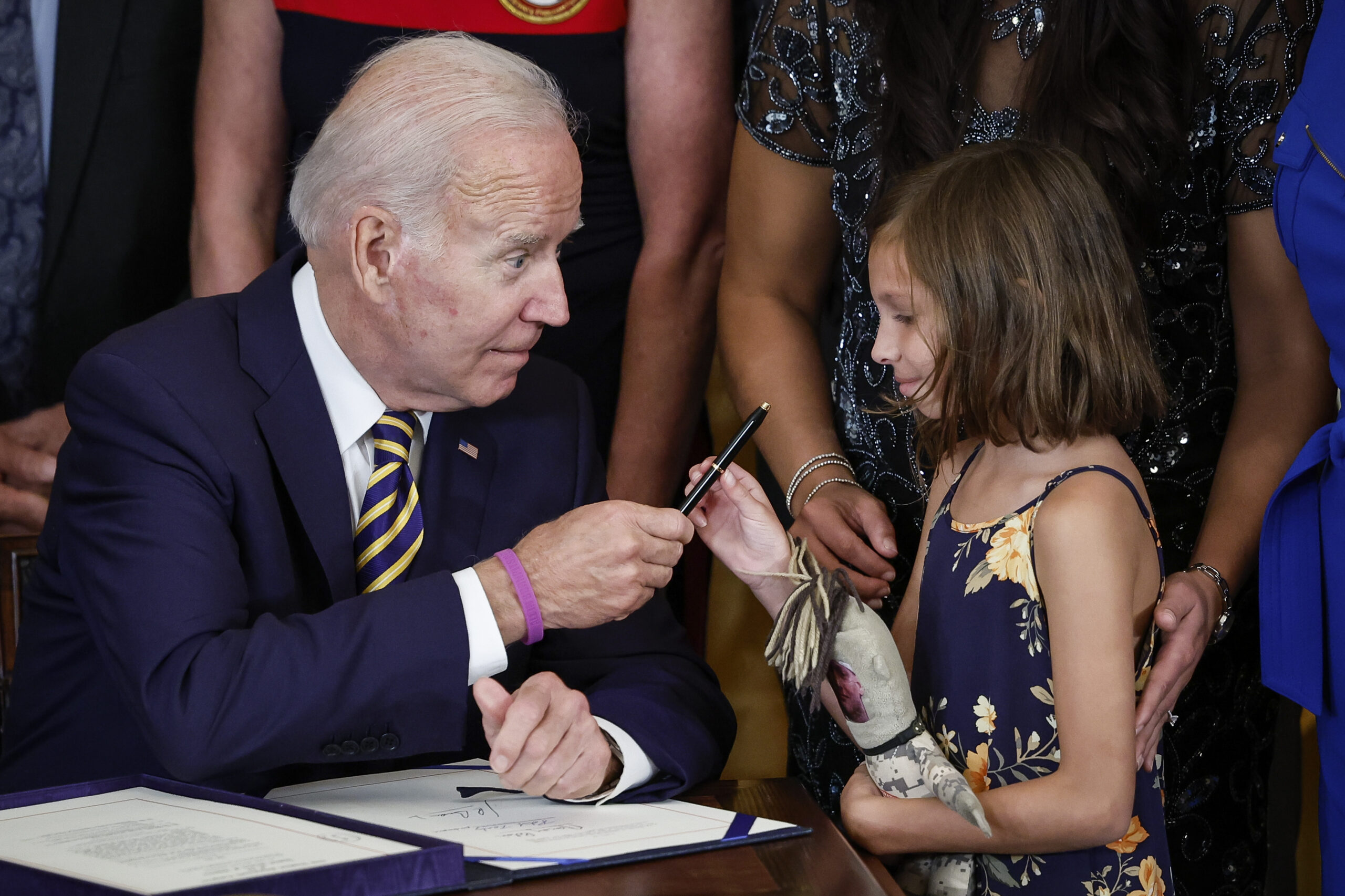PACT Act in one year aided 340,000 ailing veterans and survivors, Biden says

One of the “most significant laws ever signed to help veterans” has already assisted over 340,000 former service members and their survivors seeking care for illnesses and cancers now presumed to be connected to open burn pits and other toxins, President Joe Biden said in Utah on Thursday as he marked one year since the law took effect.
There is no overall deadline to submit PACT Act-related claims, but the deadline to qualify for retroactive benefits dating back to the law’s enactment, which earlier had been set for Aug. 9, has been extended until Aug. 14.
Biden signed the Sgt 1st Class Heath Robinson Honoring our Promise to Address Comprehensive Toxics Act, or the PACT Act, last August, expanding health care eligibility for up to 3.5 million post-9/11 veterans, and for those who served during the Vietnam and Cold War eras.
So far, $1.85 billion for PACT Act-related claims has been distributed to veterans and families, according to the administration.
The law also opened eligibility for Gulf War era, Vietnam era and veterans of earlier wars and military projects who were potentially exposed to a host of toxic substances, including tactical herbicides like Agent Orange, radiation from nuclear device testing or cleanup and contaminated drinking water.
“We’re determined to address this problem, come hell or high water, and compensate these veterans and their families who have suffered the consequences of this tragedy,” Biden said during remarks at the George E. Wahlen Department of Veterans Affairs Medical Center in Salt Lake City.
The stop was the last of a multi-day Biden trip to Western states, including both official events and fundraisers, to tout the administration’s accomplishments ahead of the 2024 presidential election.
‘It’s personal for my family’
During his remarks, Biden described burn pits the size of football fields, 8-to-10-feet deep, where “everything you can imagine is thrown,” including tires, chemicals, and jet fuel, he said.
Biden’s son Beau Biden, a veteran, suffered from a rare form of brain cancer and died in May 2015, years after being deployed to Iraq.
He spent a portion of his deployment in living quarters about 400 yards from a burn pit, Biden said.
“(Troops) breathe that toxic material for months at a time, in the case of my son and his buddies for an entire year, causing headaches, numbness, dizziness, cancer,” Biden said.
“This is not about my son, but it’s an example of how close it was … It’s personal for my family, but it’s also personal for so many of you,” he said.
The bill’s namesake, Sgt. Robinson, died of lung cancer in 2020. He served with the Ohio National Guard in Iraq in 2006 and 2007, and later attributed his cancer to breathing in emissions from burn pits where he was stationed.
Robinson was among many veterans denied VA coverage for their illnesses because they couldn’t definitively prove the health issues were service related.
At the bill’s signing ceremony in August 2022, Biden told Robinson’s daughter that his grandson’s “daddy lost to the same burn pits.”
Under the PACT Act, veterans who served in numerous geographical locations and who now suffer from one of the 23 diseases or illnesses added by the law are eligible for health coverage.
Among those 23 are chronic bronchitis, emphysema, asthma diagnosed after service, and several cancers, including brain, gastrointestinal, kidney, neck, pancreatic, respiratory and reproductive.
Glioblastoma, the brain cancer that Beau Biden died from, is among those listed.
The U.S. military uses open burn pits to manage several types of waste in foreign nations. Concerns about burn pit emissions heightened during and after the U.S. presence in Afghanistan, Iraq and other locations, triggering restrictions and ongoing studies of the health effects from airborne hazards.
The Department of Defense identified nine locations where burn pits were still being used by the military in 2019 — seven in Syria, one in Afghanistan and one in Egypt. The incinerated waste was not limited to medical waste, hazardous waste, tires and plastics, according to the Pentagon’s burn pit report to Congress.
Several of Congress’ recent annual defense policy bills have included provisions to monitor health effects and restrict and phase out burn pits.
For vets who were exposed to Agent Orange during the Vietnam era, the PACT Act now presumes high blood pressure, also called hypertension, as a service-connected disease. Monoclonal gammopathy of undetermined significance, which causes irregularities with antibody-producing cells, is another disease added to the list for Agent Orange-exposed vets.
PACT Act statistics
As of Aug. 4, 408,581 veterans have completed PACT Act-related claims, with 348,469 approved so far, according to the latest figures from the Department of Veterans Affairs.
Of those who have filed claims, 8,270 were surviving family members.
The VA estimates that there are 355,787 veterans in Maryland.
Nearly 16,000 PACT Act claims were filed in Maryland in the past year and 7,030 have been granted. About 78.5% of the 8,952 claims that have been processed in the state so far have been approved.
Veterans who are unsure whether they qualify can begin the process by completing a Toxic Exposure Screening, which 4.1 million have already done, according to the VA.
The VA asks veterans to begin the process by visiting ask.VA.gov, calling 1-800-MyVA411, or walking into a VA office.
Danielle E. Gaines contributed to this report.




 Creative Commons Attribution
Creative Commons Attribution